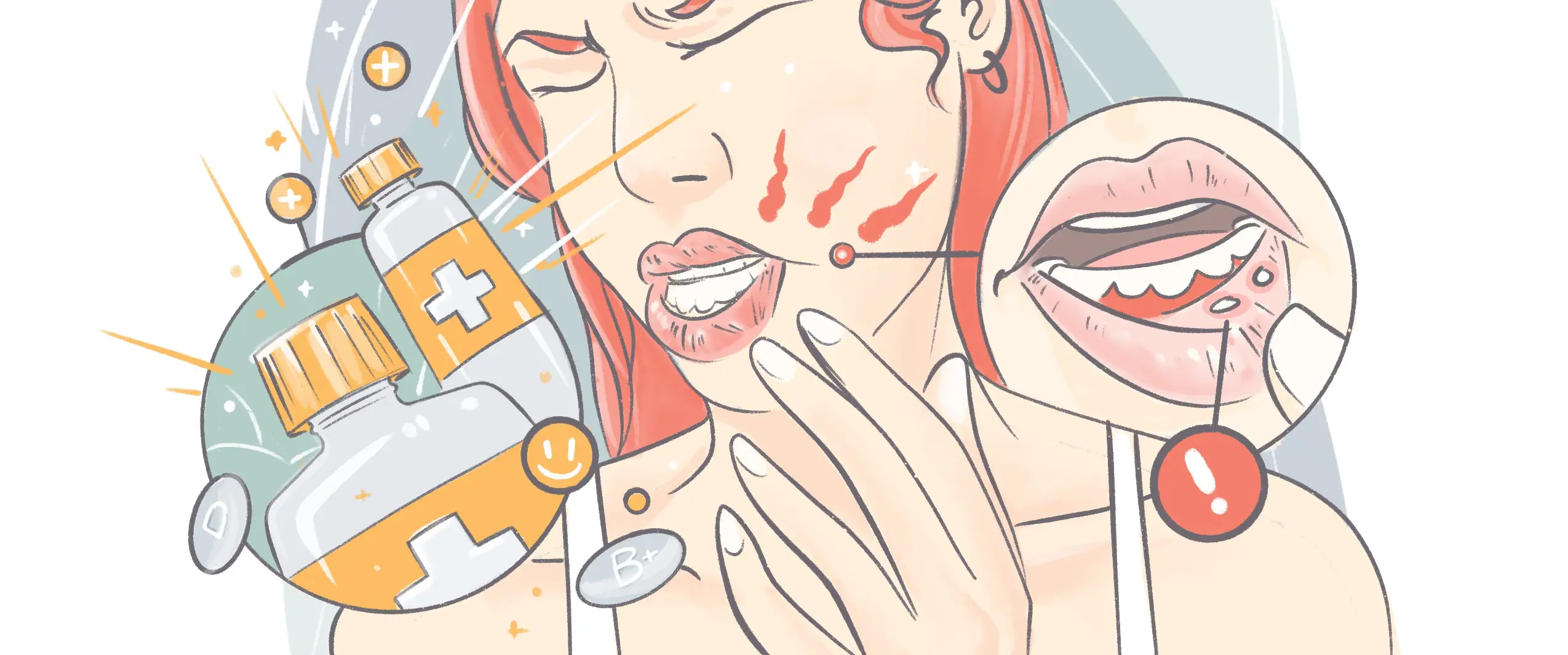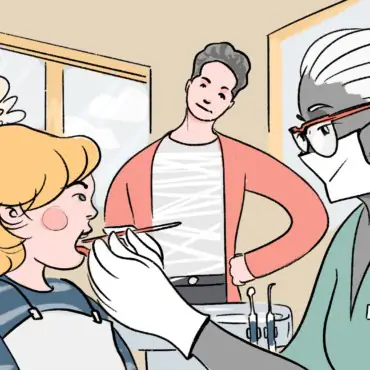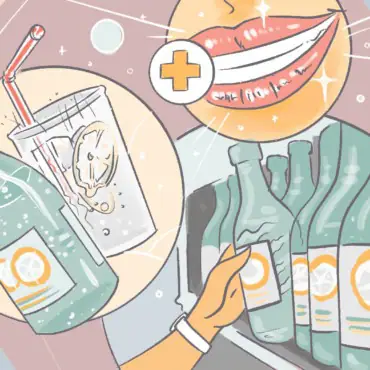Most of us have had a canker sore at some point. Despite their regularity, these tiny ulcers are largely misunderstood and often mistaken for cold sores. Let’s explore the most effective canker sore treatment.
What is a canker sore?
Aphthous ulcers, popularly called canker sores, are small and shallow lesions that develop in the lining of the mouth — affecting about 20% of the general population. Girls and women are more likely to develop canker sores than boys and men. Although they typically begin in childhood, they’re more common in our teens and 20s. Then they become less frequent as we get older.
Two to four canker sores typically appear at the same time. Different types include:
- Minor canker sores are most common. They’re usually about 1/4 inch in diameter. These tiny ulcers are round or oval and have a red border
- Major canker sores are larger — typically ½ inch in diameter or larger — and in some cases may be up to 1 inch in diameter or more. Compared to minor canker sores, these larger ones are round and will likely have defined borders. (In larger ones, some canker sores can have irregular edges. Extensive scarring remains once the sores are healed.
- Herpetiform canker sores are a rare type of canker sore and tend to develop later in life. They’re about the size of a pinpoint and tend to develop in clusters of 10 to 100 sores. The clusters may join and form one large ulcer with irregular edges.
Although uncomfortable and painful, canker sores tend to heal on their own and don’t cause any additional problems in most cases. Make sure to see the dentist if you experience intense pain and in situations when canker sores are numerous, large, or seem out of the ordinary.
What are the symptoms of canker sores?
Generally speaking, canker sores are round or oval. They usually have a white or yellow center and red border. The most common areas where they develop include the base of the gums, inside the cheeks or lips, the roof of your mouth, and on or under your tongue.
You’ll likely notice a burning sensation or tingling a day or two before canker sores appear. In some cases, canker sores may come along with other symptoms such as swollen lymph nodes, feeling unwell, or even a fever. Canker sore treatment helps mitigate this pain.
What is the white stuff in a canker sore?
Canker sores can be frustrating, and to most people, the “white stuff” is particularly uncomfortable. But don’t worry; that’s just the fibrin membrane. Fibrin is a protein that plays a role in physiological responses. The human body responds to canker sores by forming a protective layer made up of fibrin over the ulcer. Fibrin cover or membrane is usually white (but it can be yellowish or grayish) because it’s a type of scar tissue. The role of this membrane is to protect the sore while the body heals it. Canker sore treatment will help reduce the white and red sore.
What causes canker sores?
A combination of different factors may trigger the formation of these tiny ulcers. These can include:
- Emotional stress
- Mouth injury due to overzealous brushing, dental work, accidental cheek bites, sports accidents, etc.
- Hormonal imbalances during menstruation
- Toothpaste and mouth rinses containing sodium lauryl sulfate
- Helicobacter pylori (bacteria that cause peptic ulcers too)
- Insufficient consumption of vitamin B12, folate, zinc, and iron
- Allergic reaction to bacteria in the mouth
- Food allergies and sensitivities especially to coffee, chocolate, eggs, strawberries, candy, cheese, nuts, acidic and spicy foods
- Certain conditions and diseases such as celiac disease, HIV/AIDS, Behcet’s disease, inflammatory bowel diseases such as ulcerative colitis and Crohn’s disease, immune system problem
- Non-steroidal anti-inflammatory drugs (NSAIDs)
- Sharp tooth surface or dental appliances such as ill-fitting dentures and braces
- Viral infection
Are canker sores contagious?
No! Unlike other types of sores that develop in the mouth, canker sores are not contagious. We can’t develop a canker sore when sharing a kiss with someone who has it, for example. Canker sore treatment will help get rid of the sore itself, but it’s important to know that you cannot spread canker sores.
Sign up for our newsletter.
Just let us know a bit about yourself.
What is the difference between canker sores and cold sores?
Canker sores are often mistaken for cold sores and vice versa. To recognize and treat sores in the mouth properly, it’s important to learn their differences. Cold sores are a cluster of blisters that are clear at first but become cloudy later. While the first infection may be inside the mouth, cold sores generally develop outside the mouth on the lips. On the other hand, canker sores develop inside the mouth only. Canker sore treatment is only for inside the mouth, not around the lips.
Besides location, another point of difference between these two types of sores is their cause. While canker sores are typically caused by something incidental, cold sores are caused by a viral infection called herpes simplex virus (HSV). The HSV is prevalent, and figures show 50% of children entering kindergarten, and 90% of adults have it, but not all people experience symptoms.
The initial infection with HSV is quite similar to those of other viral infections and may include symptoms such as fever, swollen glands, fatigue, and multiple sores on gums and mouth. Recurrent infections are milder and are usually associated with a burning or tingling sensation a day or two before the sores appear (similar to canker sores). The cold sores are, basically, fluid-filled blisters that later become cloudy. Once the blisters are broken to reveal a bright red area, they tend to dry up, crust, and heal within seven to 10 days.
While canker sores are not contagious and can’t spread through person-to-person contact, sharing utensils, and other similar ways, cold sores are contagious. HSV can be be transmitted through any contact with blisters until the sore is healed.
How long do canker sores last?
Canker sores usually last one to two weeks and tend to go away without treatment. Burning and tingling sensations usually come first, and we experience those symptoms a day or two before canker sores show up. Then, within one to three days, a canker sore progresses from a spot into a tiny ulcer. Over the next three to four days, the ulcer enlarges to its final size and stabilizes before the healing process starts. Depending on the canker sore treatment and your body, your canker sore should be gone within 2 weeks.
In most people, it takes seven to 14 days for a canker sore to resolve itself. However, major sores may take several weeks to resolve.
The first stage of the healing process is the prodromal (beginning stage), and it is the period before the formation of the ulcer. During this stage, we feel the well-known burning sensation and tingling before a painful raised red area inside our mouth. The formation of a yellowish or grayish ulcer marks the next stage of the healing process. Redness around the ulcer is more pronounced, and pain is more intense. The final stage of the healing process occurs when a healthy tissue starts closing over the ulcer. The canker sore becomes smaller, and the pain goes away.
What gets rid of canker sores fast?
They don’t require treatment, but if you’re concerned because it’s persisting, you may wish to consult a doctor or make a dentist appointment. Canker sore treatment can often be done with home remedies, but if it is a persistent and recurring problem, it could be a good idea to see your dentist. This is particularly the case with persistent or unusually painful sores, which may require medical care.
Various options are available to help canker sores heal faster and go away.
- Your dentist or healthcare provider may prescribe a mouth rinse containing the steroid dexamethasone to alleviate pain and inflammation or lidocaine to decrease pain. Mouth rinse usually works when several canker sores are formed.
- Some prescription and over-the-counter topical products can help reduce pain and accelerate the healing process. These products work when we apply them directly onto a sore as soon as they appear. In most cases, they include active ingredients such as benzocaine, fluocinonide, and hydrogen peroxide.
- In cases when canker sores are severe and don’t respond to other options, oral medications can be helpful. These medications are not specifically formulated for canker sores, but they can help.
Due for a checkup?
Find a top rated dentist near you that takes your insurance.
Canker sore home remedies
- Gargle with a homemade mouth rinse containing 1tsp of salt in 1 cup of warm water for effective canker sore relief
- Use a cotton-tipped swab to apply a small amount of sesame oil on a canker sore four times a day for five days
- Apply salt directly to your sore: this may hurt really bad for about 30 seconds, but it is effective
- Avoid irritants such as spicy and acidic food like citrus fruits and tomatoes
- Drink cold fluids with a straw
- Maintain regular dental hygiene (use a soft toothbrush)
- Modify your diet so that it contains a wide range of vitamins and minerals to correct nutrient deficiencies
- Manage stress
- Avoid chewing gum
- Apply ice or tiny amounts of milk of magnesia directly onto the sores to alleviate pain and promote healing
- And, although rubbing alcohol may seem like it should be a simple canker sore home remedy, it won’t help. It will instead produce more pain and irritation.
- See a dentist for tips on avoiding canker sores
Why does salt help canker sores?
Rinsing the mouth with salt water is an effective management strategy for canker sores treatment or healing process after the procedure for gum inflammation. Salt helps us in two ways.
First, saltwater raises pH in the mouth. As a result, the oral cavity becomes more alkaline. The alkaline environment is harmful to bacteria, and they can’t thrive there.
When it comes to canker sores, rinsing the mouth with salt water helps clean and dehydrate the sore to promote healing, but it can also temporarily numb the pain. Keep in mind it may be painful at first, but the numbing sets in fast. Try to rinse your mouth or gargle with salt water a few times a day.
Concerned about canker sores?
Canker sores are stubborn and able to affect a person’s confidence. Fortunately, this problem is manageable, but if you’re really concerned, you should see a dentist.
Due for a checkup?
Find a top rated dentist near you that takes your insurance.








